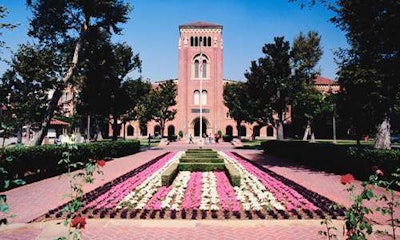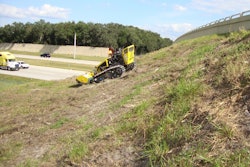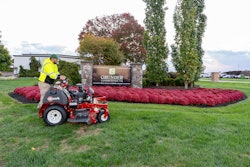 A college campus and other institutional clients represent a steadily growing share of Total Lawncare & Landscape Services’ business.
A college campus and other institutional clients represent a steadily growing share of Total Lawncare & Landscape Services’ business.Photo: Total Lawncare & Landscape Services.
Although there’s no scientific research to document the trend, more U.S. cities appear to be hiring landscape contractors to maintain lawns and roadways – work done by city employees in previous years.
“We’ve always done that with employees of the department of public works,” says Gregory Hart, borough administrator in Franklin Lakes, New Jersey. Several months ago, however, “we started looking at some contracts that were being let (by other local governments) around us and we could see the potential to save taxpayer money.”
After studying the issue, Franklin Lakes opted to contract out its landscape maintenance and roadside mowing for the first time in its nearly 100-year history. The borough’s council voted earlier this month to award a $66,000 contract to a Somerset, New Jersey, landscaping company. The contract covers 2015 and 2016.
 Local government properties such as this garden and park in New Jersey provide an increasing share of work for private landscaping companies, which are replacing the public works employees who traditionally have held those responsibilities.
Local government properties such as this garden and park in New Jersey provide an increasing share of work for private landscaping companies, which are replacing the public works employees who traditionally have held those responsibilities.Photo: Total Lawncare & Landscape Services.
Asked whether the savings from contracting out the work would be significant, Hart answered without hesitation: “Oh, yes, absolutely.”
For the company that won the bid for Franklin Lakes’ work, Total Lawncare & Landscape Services, the additional business from a city government is certainly welcome but it’s not unusual. “Actually, Franklin Lakes is on the smaller side of our municipal work now,” says Kevin Krast, founder and owner of Total Lawncare & Landscape Services. “We do some commercial, some institutional, lots of municipal and lots of schools.”
Krast believes landscaping companies throughout the country will continue to see more and more local governments choose to contract out their road and landscape maintenance to private companies. “They’re saving money by having us do it – saving tax money,” he says. “That’s why so many towns are doing it. It saves them money for things like unemployment compensation and lots of other costs.”
Not surprisingly, Krast’s company started the same way many other successful landscaping businesses take shape: It was him, his pickup truck and a good mower. That’s it.
In those days, almost all the work was residential. Now, more than three decades later, residential clients comprise less then 5 percent of Total Lawncare & Landscape Services’ business. “Actually, I’m hoping to move back into the residential work a little more in 2016,” Krast says.
Today, however, the current client mix keeps Krast and his 15 employees running hard. Which brings him to a sore subject: It’s not the lack of work that threatens reputable, well-managed landscaping companies, he says, but the difficulty of finding and keeping reliable workers.









